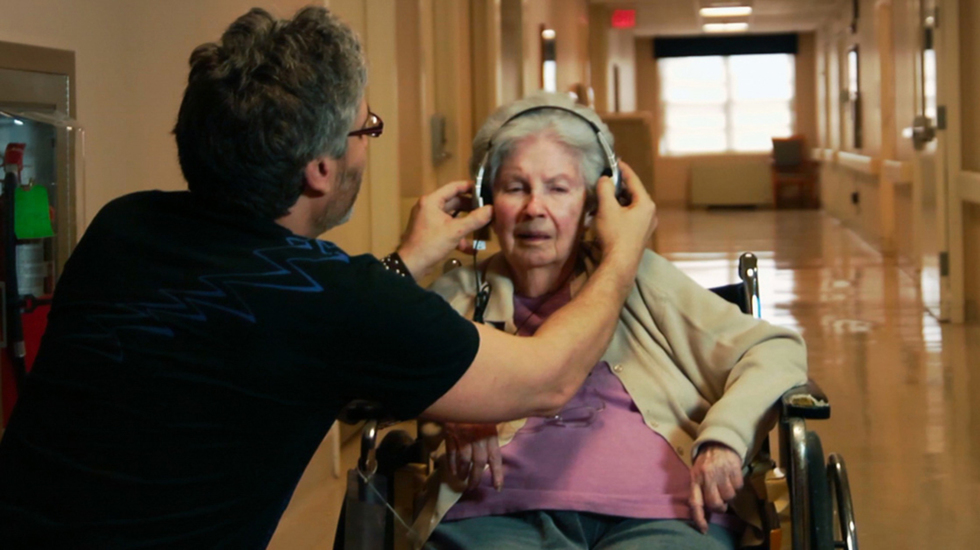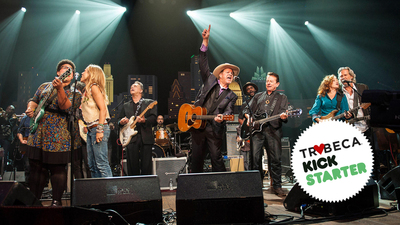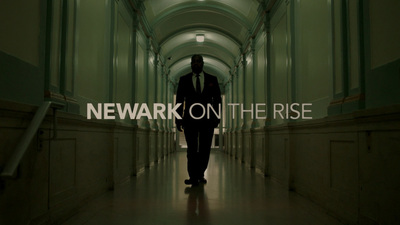
BY ZACHARY WIGON |
'Alive Inside' And The Power Of Viral Awareness
The unique story of how 'Alive Inside' garnered buzz before it even premiered.

Alive Inside is no ordinary documentary. The extremely touching film documents the efforts of one Dan Cohen, the founder of the nonprofit Music & Memory, which advocates for the use of music therapy as a means of revitalizing victims of Alzheimer's and dementia. Director Michael Rossato-Bennett's doc, which is currently in theatrical release, premiered in competition at the 2014 Sundance Film Festival, but oddly enough, the film was able to garner a huge amount of buzz before any member of the public ever saw it.
That's because a clip from the doc (above), which features a 94-year-old man - seemingly senile and practically lifeless - coming alive after being played music from his youth, went viral in a major way. After being posted to Reddit, the 6-minute clip made its way to YouTube and was shared widely on Facebook, and ended up garnering over a million views. A fascinating example of the manner in which social media can work with the promotion of independent cinema, I was thrilled to have the chance to speak with Rossato-Bennett about the film and the manner in which social media aided it.
Tribeca Film: How did you come to find this story?
Michael Rossato-Bennett: I was a filmmaker mainly doing work for nonprofits, and I was following Dan for one day, helping build a website for him, because I'd heard about what he was doing. It started out as a job and very quickly became something else. I'd never been to a nursing home before, but I followed him into one, and it was an overwhelming experience. I saw hundreds of people lining up against the halls. I thought it was the worst job I'd ever taken. Dan was volunteering at nursing homes and giving people with dementia the music they listened to when they were young. When I saw this 94-year-old man named Henry all of a sudden become filled with life, goosebumps erupted over my body. He was this being that had been hidden from himself in the world for almost ten years, and he was released. I was naive - I thought, wow, we've discovered the cure for Alzheimer's! That's not true, but there is a part of the mind and body that is very much alive all the way through Alzheimer's and other forms of dementia, and music can awaken it. It can lead us into a new way of looking at this problem. For years there's been no progress with regard to Alzheimer's. There's an economic incentive behind this, which makes me hopeful that we will change the way the medical profession thinks about treating people with dementia.
People were commenting, saying, this is what the internet's for, not pictures of cats and funny faces. The outpouring of stories and connection - I was just making a film because it moved me.
Tribeca Film: Tell me a little bit more about the scene with Henry, which started so much of this. What was going through your mind as that all unfolded?
Michael Rossato-Bennett: Henry was wheeled up in front of me, and he was a dead man - his head was slumped into his chest, he was mumbling. We put his favorite music on, from when he was 19 years old, Cab Calloway, and it really ignited his mind. It was an amazing experience. I was sitting in my bedroom one night and my son told me dad, they're talking about your movie on Reddit. Some kid named Rad9 had found Henry's clip on Dan's website, and posted it. My son and I watched it climb from 320 views to 800 views in one night, and we were amazed. The next morning it was 170,000, and by the end of the day it was a million. This was a six minute clip of an old man in a nursing home. It was the longest clip to ever go viral on the internet. Sixty times more views than any other clip about Alzheimer's has ever received. People were commenting, saying, this is what the internet's for, not pictures of cats and funny faces. The outpouring of stories and connection - I was just making a film because it moved me. I didn't realize we were all one degree of separation from this story. By the time we finished the film my stepfather had entered a nursing home, and he actually died while we were making this film.
He was this being that had been hidden from himself in the world for almost ten years, and he was released.
Tribeca Film: Were you in the process of making the feature when the clip went viral?
Michael Rossato-Bennett: Yes, I was deep into the feature at that point. But I have to tell you, when the film went viral, I had to change the entire film. It became a completely different story. I was telling a story about a great idea that could not make its way into the world, and what a tragedy that was. In the end, suddenly, the hearts and minds of people opened up and the idea of this experience occurring in nursing homes was a reality. Somebody on the staff of every nursing home in the world saw that clip. Overnight, it changed the conversation.
Tribeca Film: It's amazing - the film became a part of the story, so to speak.
Michael Rossato-Bennett: Yeah. Don't think about it too much, your brain will explode!
Tribeca Film: What are your thoughts on the role the internet can play in disseminating stories and creating advance interest in a film?
Michael Rossato-Bennett: Well, you can't try to make a clip go viral. Honestly, with the changes in Facebook, I often wonder if it would have gone viral today. That said, I love Reddit. I think the way young people have created a culture there - a non-trolling, accepting culture - it's not like YouTube, where you get these insane flare-ups. There's a kindness to the exchanges on Reddit, and I was very inspired by that. I believe the internet has a phenomenal capacity. We've seen it with Alive Inside. But it's interesting, the way things play out on the internet. I think we're in a honeymoon phase with the internet, kind of like how the '60s were a honeymoon phase of social change through protest - now protest does nothing to create social change. I think we're moving out of the honeymoon phase soon - the forces that be have figured out how to deal with the power of the internet, and they can make tremendous inroads to stifle and reduce the effectiveness of the internet as a force for social change. Yes, the internet is an incredible force for social change, but why has the world not become a better place since its advent? The internet is indispensable for creating communities and culture, however. I mean, in a year personalized music will become reimbursable for nursing homes, I believe.
I was telling a story about a great idea that could not make its way into the world, and what a tragedy that was.
Tribeca Film: You said you wonder if the clip of Henry would go viral today in light of recent changes to Facebook. Can you say more about why that's the case?
Michael Rossato-Bennett: The clip going viral was why it started on Reddit, but it then went to Facebook, and I think it spread more over Facebook in the end, it spread to a more diverse audience. I can imagine sitting at the computer, and seeing a pop-up that says, your clip of Henry is performing better than 90% of your other clips. Would you like to promote it for $100 or $200? I wouldn't have had any money to promote it, and it would have died a slow death like so many other beautiful things that stay within small circles today.
Tribeca Film: Well, it's certainly fascinating that the change that did occur ended up steering the film in a totally different direction.
Michael Rossato-Bennett: When I was making the film, I had the feeling the clip was one of the first big clips to go viral. This was two years ago. It was just so unlikely that it performed the way it did - it was six minutes long, which is an eternity for the internet.

